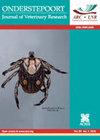In Vitro and in Vivo Activity of Lactobacillus Sakei L14 Strain Against Campylobacter Jejuni DC3 Strain
IF 1.6
3区 农林科学
Q2 VETERINARY SCIENCES
引用次数: 0
Abstract
Abstract Introduction Domestic poultry is a natural reservoir of Campylobacter, the host–pathogen interaction being predominantly asymptomatic. This study investigated whether chickens remain asymptomatic partly because of lactic acid bacteria (LAB). Material and Methods Campylobacter spp. and LAB were isolated from the gut of poultry chickens using enrichment and screening assays and were identified via rDNA sequencing. The C. jejuni DC3 isolate was grown in different cell-free supernatants (CFS) generated from a priority LAB isolate. An in vivo challenge involving the C. jejuni and LAB isolates using a chicken model was performed to confirm the in vitro findings. Results Twelve presumptive LAB isolates had anti-C. jejuni activity based on cross-streak and agar plug assays, with Lactobacillus sakei L14 isolate exhibiting the highest activity. Inhibition by L. sakei L14 CFS of the growth of C. jejuni occurred in a dose-dependent manner. Campylobacter jejuni DC3 inhibition was most evident in CFS harvested at 72 h and produced by co-culture with the pathogen. Neutralisation of the CFS abrogated the observed inhibition. Co-infection with C. jejuni DC3 and L. sakei L14 in vivo, however, failed to inhibit C. jejuni colonisation in chickens. Conclusion The results suggest that the anti-C. jejuni effect of L. sakei L14 in chickens may be due to mechanisms other than direct inhibition of growth.酒井乳杆菌L14对空肠弯曲杆菌DC3的体内外活性研究
摘要简介家禽是弯曲杆菌的天然宿主,宿主-病原体相互作用主要是无症状的。本研究调查了乳酸菌(LAB)是否在一定程度上导致鸡无症状。材料与方法从家鸡肠道中分离到弯曲杆菌(Campylobacter spp)和乳酸菌(LAB),并通过rDNA测序对其进行鉴定。将C. jejuni DC3分离物培养在由优先LAB分离物产生的不同无细胞上清液(CFS)中。利用鸡模型对空肠梭菌和乳酸菌进行体内攻毒,以证实体外研究结果。结果12株推定乳酸菌具有抗- c抗体。通过交叉条纹法和琼脂塞法测定空肠活性,其中酒井乳杆菌L14的活性最高。酒井L14 CFS对空肠梭菌生长的抑制呈剂量依赖性。空肠弯曲杆菌DC3的抑制作用在72 h收获的CFS中最为明显,并与病原体共培养。中和CFS消除了观察到的抑制作用。然而,在鸡体内同时感染空肠梭菌DC3和L. sakai L14并不能抑制空肠梭菌在鸡体内的定殖。结论抗c。白井乳酸菌L14对鸡空肠的影响可能是由于其直接抑制生长以外的机制。
本文章由计算机程序翻译,如有差异,请以英文原文为准。
求助全文
约1分钟内获得全文
求助全文
来源期刊
CiteScore
4.30
自引率
0.00%
发文量
13
审稿时长
16 weeks
期刊介绍:
The Onderstepoort Journal of Veterinary Research, is the official publication of the Onderstepoort Veterinary Institute. While it considers submissions from any geographic region, its focus is on Africa and the infectious and parasitic diseases and disease vectors that affect livestock and wildlife on the continent.

 求助内容:
求助内容: 应助结果提醒方式:
应助结果提醒方式:


